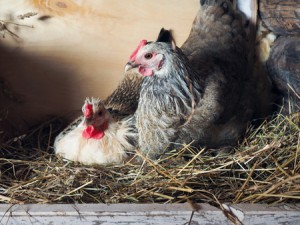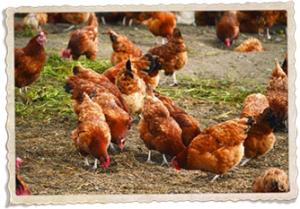Coccidiosis is a common disease found in backyard chickens. It’s an intestinal disease that occurs as a result of your chicken ingesting protozoa (specifically those of the genus Eimeria), that is, a microscopic parasitic organism that latches onto the lining of a chicken’s gut, causing it to bleed. It can be potentially fatal to your chickens, so, you should be well-versed in how to prevent and treat coccidiosis so that your chickens stay happy and healthy.
Symptoms of Coccidiosis
Once your chickens ingest the protozoa, it can take as little as 4-8 days for symptoms to occur. Some of the most common symptoms are:
- Weakness and fatigue
- Huddling together as if cold
- Weight loss
- Pale comb and skin
- Inconsistent egg laying (or none at all)
- Diarrhea
- Ruffled feathers
- Lack of growth in baby chicks
Treating Coccidiosis
If you catch the symptoms early, treatment for coccidiosis can be quick and effective. The first thing you should do is isolate your sick chickens from the rest of the flock and immediately clean out the coop. After the flock is separated, you’ll want to administer drug treatments like Amprolium which are added to the chickens’ water supply. However, you should consult your veterinarian to figure out the best course of treatment.
Prevention of Coccidiosis
In the long-run, it’s better to prevent coccidiosis then having to treat it. Since sporulation occurs in wet or humid areas, it’s best to keep your chicken coop dry, clean, and disinfected at all times. Your chickens’ food and water should also be kept clean, as this is prime real estate for potential parasites. There are also two main kinds of preventative medications that can be added to your chickens’ food or water supply: coccidiostats and coccidiocides. The former helps your chickens gradually develop an immunity to coccidiosis, while the latter kills coccidiosis. Finally, there are vaccinations available, but the administration is often complicated, and it only works in the proper environments.
At Chickens for Backyards, we care deeply about the health and happiness of every chicken. So, if you have any further questions on how to prevent coccidiosis, or if you’re interested in raising chickens yourself, feel free to give us a call at 888-412-6715.

